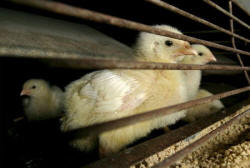|
 Iowa
chicks sent as far away as Brazil to evade deadly bird flu Iowa
chicks sent as far away as Brazil to evade deadly bird flu
 Send a link to a friend
Send a link to a friend
[July 20, 2015]
By Tom Polansek
(Reuters) - Less than 24 hours after a
deadly infection of bird flu was confirmed at a turkey farm north of Des
Moines, Iowa, Bud Wood packed about 3,500 rare baby chicks into boxes
and put them in the back of a truck.
|
|
 With the delicate birds just hours old, the president of Murray
McMurray Hatchery hit the road around 1 a.m. on a Saturday to drive
through the night to a friend's farm in Texas "just to have them in
a safe place," he said. With the delicate birds just hours old, the president of Murray
McMurray Hatchery hit the road around 1 a.m. on a Saturday to drive
through the night to a friend's farm in Texas "just to have them in
a safe place," he said.
Breeding chickens that are the valuable genetic source for
egg-laying hens have gone into hiding as the outbreak of bird flu in
poultry has developed into the worst animal-health emergency in U.S.
history. Some have been relocated as far away as Brazil.
Wood's breeding stock includes chickens with genetic lines that date
back to the early 1900s. Some of the breeds are so rare, he said,
that if they were ever wiped out by the flu, "even to find them and
build them back up to bigger numbers would take a long time."
So when turkeys about 13 kilometers (8 miles) from Wood's hatchery
in Webster City, Iowa, were infected, he scrambled to relocate his
most precious birds.
Wood made a "Noah's Ark" list of breeds he had to move to safety,
including male and female White Cochins which look like snowballs
with masses of downy feathers, and Anconas, a breed with lustrous
black plumage that originated in Italy. He plans to keep the
chickens in Texas through next spring while he monitors the virus in
the Iowa epicenter.
 Bird flu has killed more than 48 million chickens and turkeys since
December, with most of the losses affecting egg-laying hens in Iowa,
the top egg-producer in the United States. U.S. egg prices have
soared as a result.
China halted imports of all U.S. poultry products this year because
of the outbreak, while other global buyers have imposed more limited
restrictions on trade.
FALL'S MIGRATING BIRDS A WORRY
Poultry breeders and hatcheries want to keep the flu away from their
chickens, which are bred to produce hens for commercial operations
and backyard coops.
Breeders and hatcheries are relocating parts of their flocks even
though Iowa has had a month free of new infections in any poultry.
Warm weather has made it harder for the virus to survive outdoors,
but the U.S. Department of Agriculture is worried that new cases
will surge in the fall as wild birds that spread the disease begin
migrating south.
[to top of second column] |

Egg farmers whose hens have died because of the virus are making
plans to fill their barns with new chickens in the coming months and
will depend upon breeding stock to provide the replacement birds.
Hy-Line International, the world's biggest genetics company for
egg-laying chickens, moved part of its breeding stock from Iowa to
several other states within the last few months, said Tom Jorgensen,
general counsel for the company. Before the outbreak, Hy-Line kept
portions of its flock in just one other state as a precaution, he
said.
The best genetic lines for egg quantity and quality can be used to
breed hens year after year.
Jorgensen declined to reveal where Hy-Line had shipped its breeder
birds, citing "security." The company, which is owned by the EW
Group GmbH in Germany, is preparing to move more birds out of Iowa
as a precaution, he said.
Hy-Line also shipped some of its breeding stock to Brazil to ensure
the birds can be exported to overseas buyers who restrict exports
from the United States because of the outbreak.
"I can tell you just other states," Jorgensen said about the U.S.
destinations for the relocated birds. "We keep that part
confidential."
Murray McMurray and Hy-Line said none of their flocks have been
infected with the virus.
(Reporting by Tom Polansek; Editing by Diane Craft)
[© 2015 Thomson Reuters. All rights
reserved.]
Copyright 2015 Reuters. All rights reserved. This material may not be published,
broadcast, rewritten or redistributed.
 |